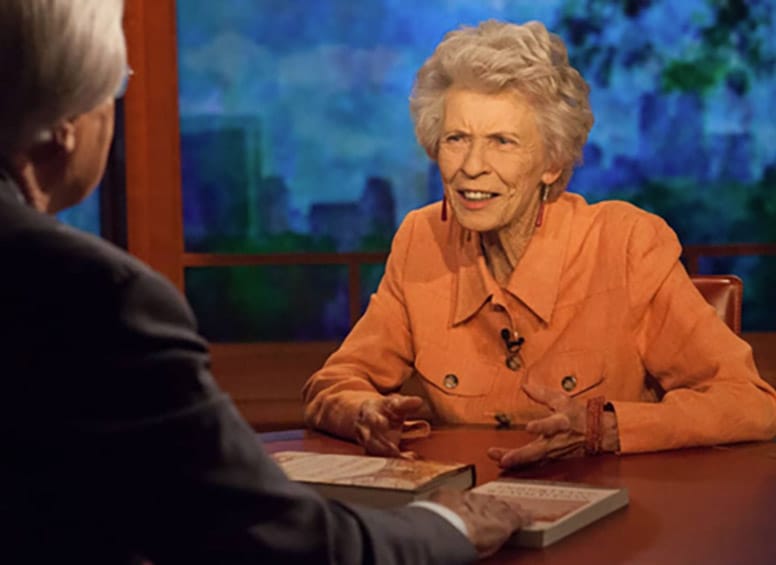Acclaimed Historian and CGU Alumna Joyce Appleby, 1929–2016

Over the past several weeks, media outlets have been celebrating the intellectual work of historian Joyce Appleby, longtime UCLA professor and Claremont Graduate University alumna, who in her critically acclaimed books specialized in historiography and the political thought of the early American Republic.
The author of several award-winning books that freshly re-examine and re-engage early American history, including Inheriting The Revolution: The First Generation of Americans and Shores of Knowledge: New World Discoveries and the Scientific Imagination, Appleby died December 23 in Taos, New Mexico, at the age of 87.
She belonged, according to The New York Times, to a vibrant generation of historians who “examined the ideologies and beliefs that animated the American Revolution.”
Born in Omaha, Nebraska, Appleby received a BA in history at Stanford University and an MA in history from UC Santa Barbara. She pursued a journalism career as a writer for Mademoiselle in New York City and then as a freelancer for the Pasadena Star-News.
Realizing her affinity for the American past over the journalistic present, Appleby decided to enroll, after the birth of her third child, in the History program at CGU—then known as Claremont Graduate School (CGS). She received a PhD in History from CGS in 1966.
Attending CGS, she told a CSPAN interviewer in the mid-1990s, enabled her to pursue her doctoral work while raising a young family.
But her choice of The Claremont Colleges was not merely for convenience. It also put her in close touch with two figures she said had a decisive impact on her academic formation and future career: Claremont School of Theology’s Sidney Mead, who Appleby said taught her how to trace the pervasive cultural influence of religion in American history; and CGS Professor of History Douglass Adair.
Adair, Appleby told CSPAN, was her mentor and a powerful influence on her field of study for her doctorate.
“Douglass Adair was a wonderful man,” she recalled, “a Southerner from North Carolina with a soft accent who worked on Jefferson and Madison and made them come alive. These people were like friends of his.”
Her exposure to Adair’s handling of the Founding Fathers made her change course.
“I was going to study the late 19th century,” she said, “I met Adair and changed all that. I changed to colonial history.”
In the foreword to Adair’s The Intellectual Origins of Jeffersonian Democracy, Appleby reminisces further about her Claremont days and meeting with Adair in his office.
“Students always seem to recall the physical appearance of their mentor’s office, probably because the moments spent in it are scorched into memory,” she writes. “Adair’s was the usual book-lined study, but because the lovely old building in which the graduate school was housed had 10-foot-high ceilings, his bookshelf was outfitted with a handsome, polished wood ladder that I often saw him climb.”
At CGS, she would complete the doctoral dissertation, “An American Pamphlet in Paris: The Career of an American Pamphlet in French Revolutionary Politics, 1787–89.” Her dissertation examined the impact of an American political publication in the earliest moments of the French Revolution, a study that also spanned the foreign service of John Adams and Thomas Jefferson.
Appleby later developed this dissertation as a series of scholarly articles while she researched her first book, which was published in 1978, Economic Thought and Ideology in Seventeenth Century England.
Over the years, in various interviews, Appleby always held CGU’s history faculty in high esteem and, in the years right after completing her doctorate, she served the university as a guest lecturer and an at-large Trustee.
For her service and rising profile in historical scholarship, Appleby was admitted into the university’s Alumni Hall of Fame and, in 1996, received the university’s Distinguished Alumni Award.
The profession of historian came relatively late to Appleby, at the age of 36—“it was a second career,” she has said—and her desire to become a professor and scholar, she told Bill Moyers in a 2013 interview, was largely motivated by a simple thing: curiosity.
“I don’t think I ever had a long-term goal in mind,” she told Moyers. “I was curious about things, and I think that is the key to a historian and probably all knowledge makers.”